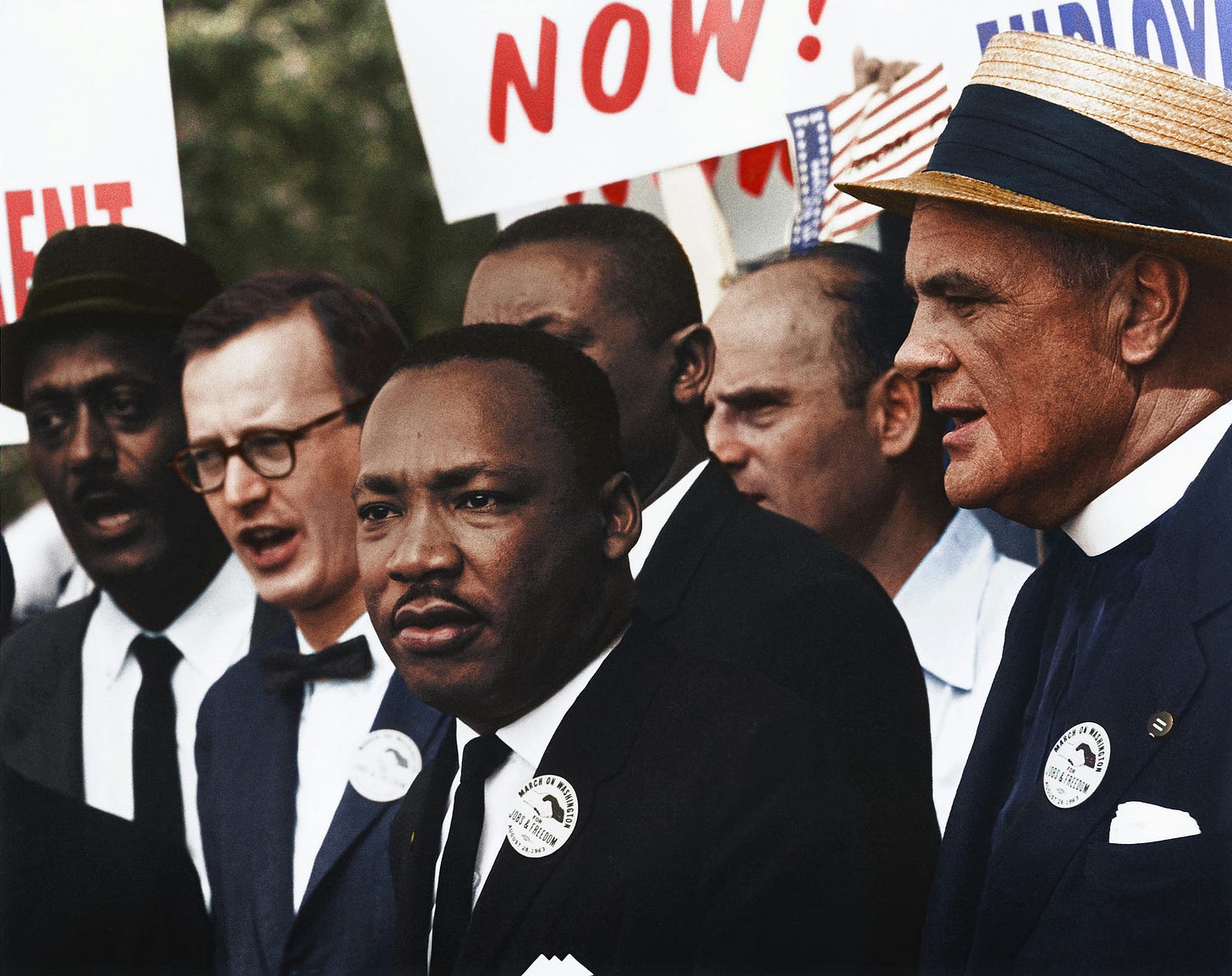Re-Learning Dr. King's Christianity
A (very) small reflection on my journey to re-frame the man, civil rights leader, pastor and follower of Jesus
When I first learned about the Civil Rights movement of the mid-twentieth century and about Martin Luther King Jr.’s role in it, I could not have been older than seven or eight, perhaps younger.
I remember sharing what I learned about him with the adults in my life. I was interested in his accomplishments, but mostly that he was a pastor like my dad.
I was met with dismissiveness.
“You know, he was kind of a ‘womanizer,’” I was told in a way that was meant to discredit not only his civil rights work, but his Christian commitment.
I’m not here to argue about whether or not MLK ever sinned. He was human, I know the answer to that.
But I note this because while growing up in evangelical churches, I often heard stories of many imperfect saints of the past offered up as examples for our own day. Yet Dr. King’s name and life was noticeably absent.
Further complicating this was the theological environment that I grew up in which had a deep love for Scripture, yet simultaneously emphasized a duality that prioritized the private spiritual life and diminished any kind of public witness.
Certainly, one was called to love their neighbor, but this was an individual responsibility and certainly not one that should become “political” or “social” in any sense.1
The combination of this dualistic theology with the absence of King’s voice or legacy from any discussion of the Christian heritage in the United States, let alone church history in general, led me to assume there was a legitimate reason King was not mentioned.
“Maybe he wasn’t really a Christian,” became the message I internalized.
Questioning King’s salvation is not uncommon in more conservative theological circles. Primarily because of the distinct lack of focus in his ministry of, “saving souls for eternity,” as many evangelicals would describe it.
Yet a brief consideration of King’s own life and writings make it hard to imagine that his ministry was not motivated out of a theological and personal spiritual conviction as a follower of Jesus.
One example shows how much King valued discipleship to Jesus as part of his non-violent movement, the Southern Christian Leadership Convention (SCLC).
In his book, “Why We Can’t Wait,” which explains the story of SCLS’s “non-violent direct action” program in Birmingham, Alabama, King explains how those who volunteered to march went through an intense psychological screening process and trained extensively in the core tenants of their movement.
The 10 Commandments of non-violent direct action, as King called them, strike me as profoundly well grounded practices for Christian discipleship.
They are:
Meditate daily on the teachings and life of Jesus
Seek justice and reconciliation, not victory
Walk and talk in the manner of love for God is love
Pray daily to be used by God in order that all might be free
Sacrifice personal wishes in order that all people might be free
Observe with both friend and foe the ordinary rules of courtesy
Seek to perform regular service for others and for the world
Refrain from the violence of fist, tongue or heart
Strive to be in good spiritual and bodily health
Follow the directions of the movement and the leader on a demonstration march2
I’m not sure there is a single one of these core commitments that one could argue are not core practices to a holistic discipleship.
Yet this profound focus on Jesus’ life and teaching, prayer, reconciliation, and more, seem to have somehow disqualified King from consideration as part of our shared Christian heritage, at least that is how it often was communicated to me as a child.
Over the last ten to fifteen years, the incoherence of this reality has slowly become more and more obvious to me. I’ve read a lot, and still am learning, about how King’s legacy is often left unconsidered in many churches.
But mostly I’m re-learning about the faith of the man himself and the incredible work God did in and through him and the Christians associated with SCLC. I’m re-learning how theologically robust his rationales for action were. How it is downright impossible to commit to non-violence the way he did without firm commitment to the way of the cross. The way of Jesus.
Today on Martin Luther King Jr. Day, I’m explaining to my daughters that the man they heard about in school did what he did because he was a pastor, like their dad. And that he believed that the Gospel changes everything and that’s why he did what he did.
I pray we continue to grow in our recognition of the rich heritage King and the rest of SCLC have left for us, and learn from those who have known all along.
I will probably need to unpack this dualism more in an other post. Suffice it to say for now that this dualistic Christianity tends to minimize the Word’s embodied incarnation in Jesus until it becomes barely necessary.
See Martin Luther King Jr., “Why We Can’t Wait,” Chapter 4, for more on the process of selecting and training volunteers for the march and the commitment they had to make to practice the way of Jesus.




Good stuff. I'm re-reading Why we can't wait right now. Thanks for the article.
Thank you for sharing.